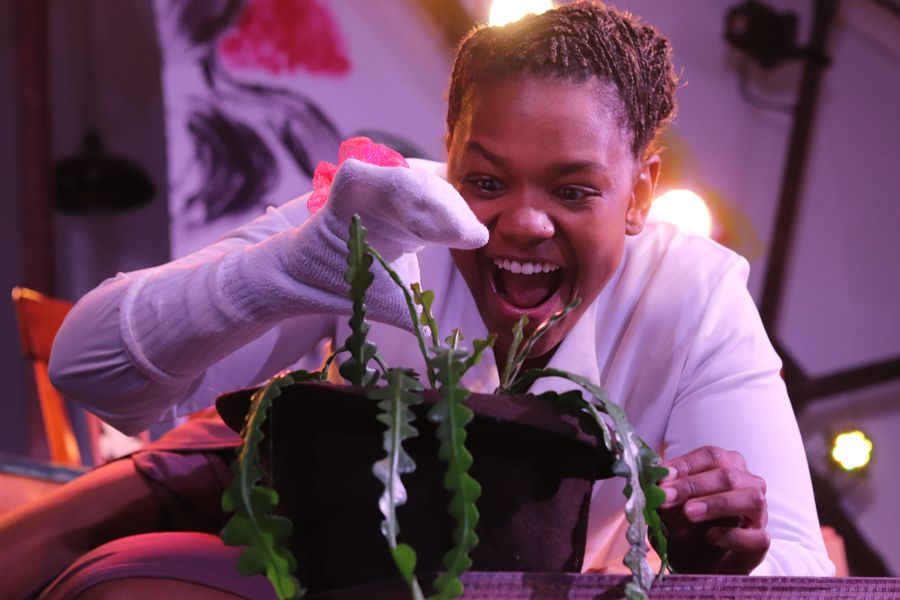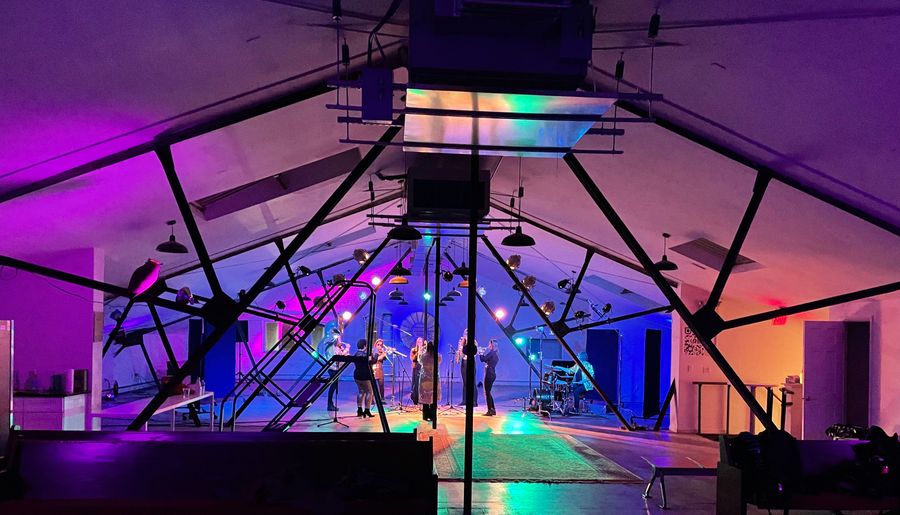CHALLENGE
To make theatre affordable for its audiences and sustainable for its creators
PLAN
Adopt a monthly membership model similar to streaming platforms
WHAT WORKS
Establishing a cumulative growth model, so that recurring membership revenue eventually sustains the theatre
WHAT NEEDS WORK
Building a large, loyal, accessible community of members and artists in Brooklyn and beyond
WHAT’S NEXT
Expanding membership programming to include online streaming options and VR content
Super Secret Arts is trying something different. The newly opened theatre in the Gowanus section of Brooklyn is doing its part to shift the economic paradigm around theatremaking. For $25 a month, subscribers receive unlimited access to the theatre’s programming, which includes mainstage productions and a nightly assortment of events, from live music to improv and sketch comedy, from cabarets to open mics and other experimental works.
Founding artistic director Toby Singer says he wanted to make theatre responsibly. The Black Lives Matter movement, We See You White American Theater, and the COVID-19 pandemic all sparked valuable conversations about representation, access, safety, and equity in the performing arts industry. But Singer noticed that funding options were often missing from these conversations.
“There was very little talk about the economic reality of theatremaking,” said Singer. “So it got me thinking about, essentially, what would a theatre company look like that could break with the traditional modes of arts funding? You have the not-for-profit models, you have the sort of high-capitalization corporate commercial models like Broadway and big tours.”
But how can you shift the industry paradigm if you are still dependent on the same old institutions? Singer ultimately landed on a subscription model for Super Secret Arts, a strategy borrowed from streaming networks like Netflix and Hulu. The subscription concept is not entirely new to the theatre, of course. Many theatres offer season passes, advanced ticket packages, or membership tiers. But Super Secret Arts has even more to offer.
“‘Subscription’ gets used a lot in the theatre world,” Singer explained. “But usually what it means is that you buy tickets to every single show up front, you have your usual seat, it’s a whole thing. And oftentimes, it’s attached to a donation that you’re making on top of that.”
Super Secret Arts works differently: The $25 monthly subscription gives members free access to any and all performances in a given month. As long as there’s room to accommodate them, members can come any time, as many times as they want. In addition, members have the option to bring guests at a discounted rate of $15. The team at Super Secret Arts is also in the process of securing a variety of membership perks and discounts at local businesses, bars, and restaurants for subscribers to enjoy. So far, Singer says, over 300 members have joined the Super Secret Arts community since it opened in February.
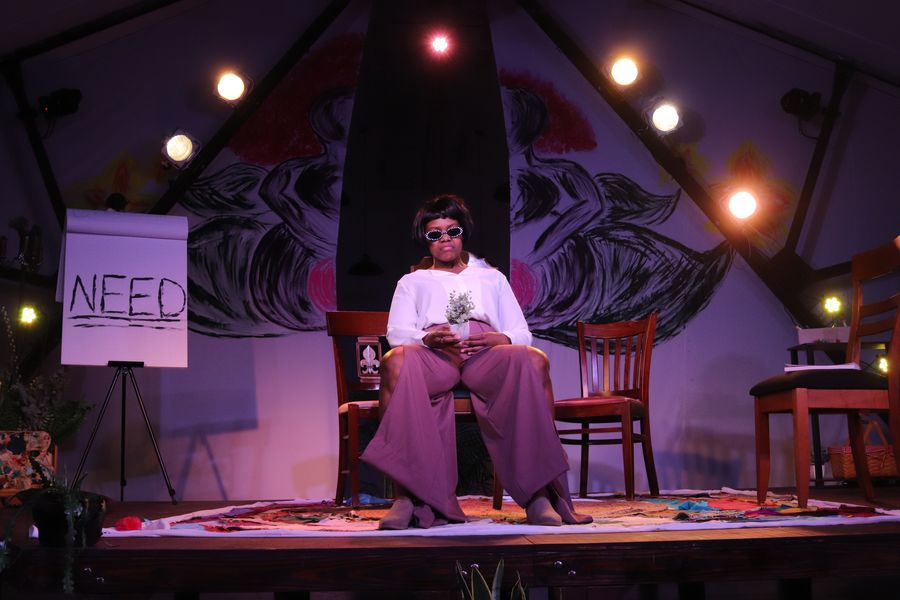

Perhaps it’s true you can get more for your money in Brooklyn. As for what to expect from Super Secret Arts, there’s sure to be something for everyone. Bonita Jackson’s This Soil, These Seeds… is playing through April 30. There’s the weekly Monday night Super Secret Cabaret, the new music Sunday Social (potentially with late brunch), Night Boy: A Comedy Variety Show, Story Dungeon: An Improv Comedy Show Powered by AI Dungeon, Working Title: Improv Musical Theatre, music by Brooklyn’s own Brass Queens and The Climactics, the premiere of the musical memoir Injured List, and much more.
The theatre currently has an open submissions policy and the team enjoys building cabarets around unconventional pitches, such as their astrology-focused Sing Through the Signs. Super Secret Arts plans to hold a slightly tongue-in-cheek On-the-Gowanus Festival for new works in July.
Over the course of the next few months, with the help of Singer’s business partner and resident VR specialist Kevin Laibson, the company also plans to introduce a variety of digital features, including exclusive video and audio content, digital-only installations, and virtual reality performances for members.
“That’s going to be a core element in the near future to this value proposition for our members,” Singer says, “that you can essentially come in person any time you want for the $25, or, if you’re sick or you’re tired from work, or you just don’t want to get off the couch, or COVID is frightening—which are all valid reasons—you have the ability to watch what we’re doing at the space from home. And that could be in VR, if you are one of those people that has goggles and is into that thing, or just on your laptop or some other kind of screen.”
Singer acknowledges the risks associated with this operating model.
“At the beginning, it is a cut—there is a loss inherent in this model, because you are essentially building and running a production budget from zero. But the way that this works is that over time, anyone that comes to our shows is essentially a member and becomes a part of our community. And hopefully, if they like what we’re doing, and they like us and they like the vibe, they’ll stay. And so the idea is, over time, we create a cumulative growth model, where eventually we have a very large member base.
“By large, we’re not talking TV, Netflix, Hulu scale—we’re talking thousands of people. And the idea is that over time, that recurring revenue base allows us to run the theatre on the back of that membership model alone. So yes, it’s rough at the beginning, and then it gets better over time as we grow this community.”
There are many conceivable advantages to running a theatre this way. As the community grows, production values improve, artists can be paid more, and the theatre can support even more creative work. By crowdsourcing its funding, Super Secret Arts can distribute artistic risk across its membership base and presumably present works deemed too bold for traditional theatre environments, which might otherwise be required to undergo lengthy development processes.
“We’re creating an artistic environment where adventurous art has a chance to breathe, a place that is safe for everyone to express themselves in the way they wish, and, perhaps more than anything else, a place that is kind,” Singer emphasized. “We like to say that we’re making a theatre company as if theatre was just invented. Part of that is creating a place that centers the artist, their well-being, and supports their joy.”
The theatre industry tends to be set in its ways. And while there is value in tradition, an unwillingness to adapt can hinder progress, particularly in a field where biases are entrenched. That is why it is important to build innovative measures into a company’s infrastructure from the beginning. As Singer explains, “For theatre, being an industry that is slow to adapt—I think that’s a pretty diplomatic way of saying it—this is a fairly significant departure from the way things normally are. One of the reasons we haven’t seen this necessarily in other places is that it’s hard to pivot an existing multi-million-dollar budget to something that probably would feel very risky. So in a certain sense, it would take an organization kind of trying this from scratch, where we don’t have a lot of institutional history to sort of hold us.”
One theatre previously introduced a similar subscription model. When Gian-Carlo Scandiuzzi took over as executive director of Seattle’s ACT Theatre in 2008, he launched the ACTPass program, which helped the theatre survive the recession. For $30, pass holders could get free access to most mainstage and in-development shows, plus half-price tickets for friends, discounts, and other benefits. Scanduizzi also introduced a Pay What You Can (PWYC) policy for available mainstage tickets on the afternoon of performance.
While ACT Theatre no longer offers the ACTPass and currently has no plans to resume the program, there are still ticket packages available for purchase, and a PWYC option for Sunday evening performances, subject to availability starting at 6 p.m.
For Singer, it’s not as much about competing for a place within the New York theatre scene at large as it is about creating a space for their community.
“We’re really interested in being a theatre for the hyperlocal part of Brooklyn that we live in,” Singer said. “That’s one of the things that I think a lot of theatres in New York get wrong. We’re not a theatre for Manhattan necessarily. We’ll happily have people come from Manhattan. But what I want to be is a theatre for Gowanus. I want to be a theatre for Park Slope, and for Prospect Heights, and Cobble Hill, and Carroll Gardens, and Red Hook, and Fort Greene, and Bed Stuy, and all the neighborhoods that are essentially walkable or a couple of train stops. Because I think this part of Brooklyn is somewhat underrepresented from a theatrical infrastructure perspective, and [community] starts from that.”
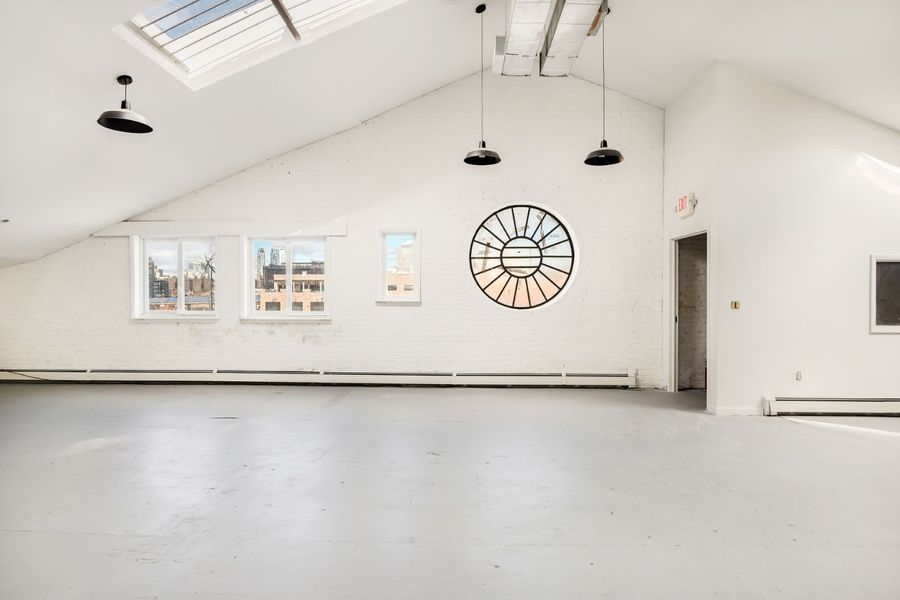
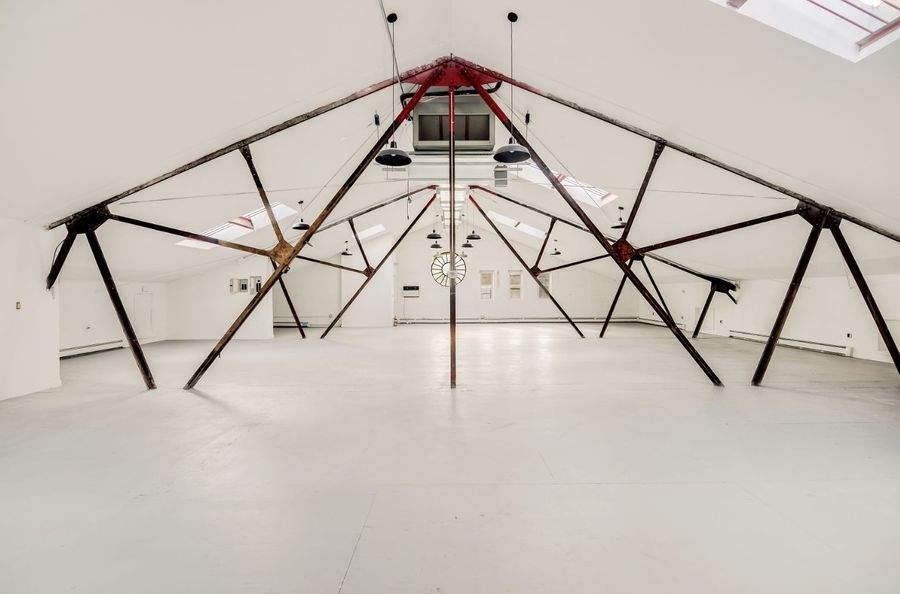
The troupe’s 4,000-square-foot second-floor loft features 10 skylights, exposed iron rafters, a kitchenette, two bathrooms, full HVAC, folding chairs, stools, tables, church pews, and other “interesting chairs.” Affectionately described as an “industrial attic church,” the venue boasts views of downtown Manhattan and Brooklyn. The space is not yet wheelchair accessible, but is undergoing the necessary renovations to make that possible.
Singer views this as all part of the community-building process. Super Secret Arts even has longer-term aspirations of expansion. Once the Brooklyn location is fully established, Singer says, he hopes to add another location in Astoria, Queens.
Hopefully, if the theatre becomes Brooklyn’s worst-kept secret, Gowanus can be known as more than a Superfund site.
Alexandra Pierson (she/her) is associate editor of American Theatre. apierson@tcg.org

